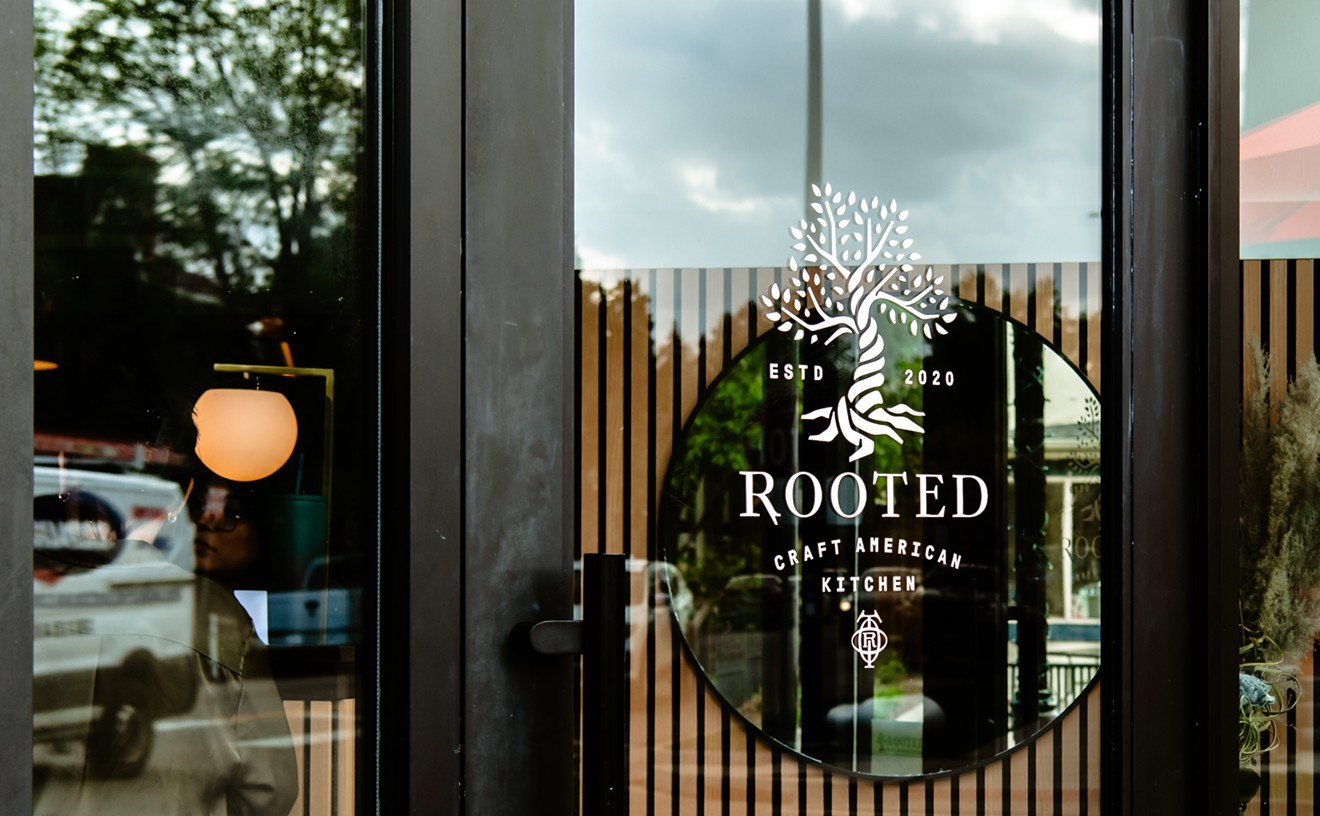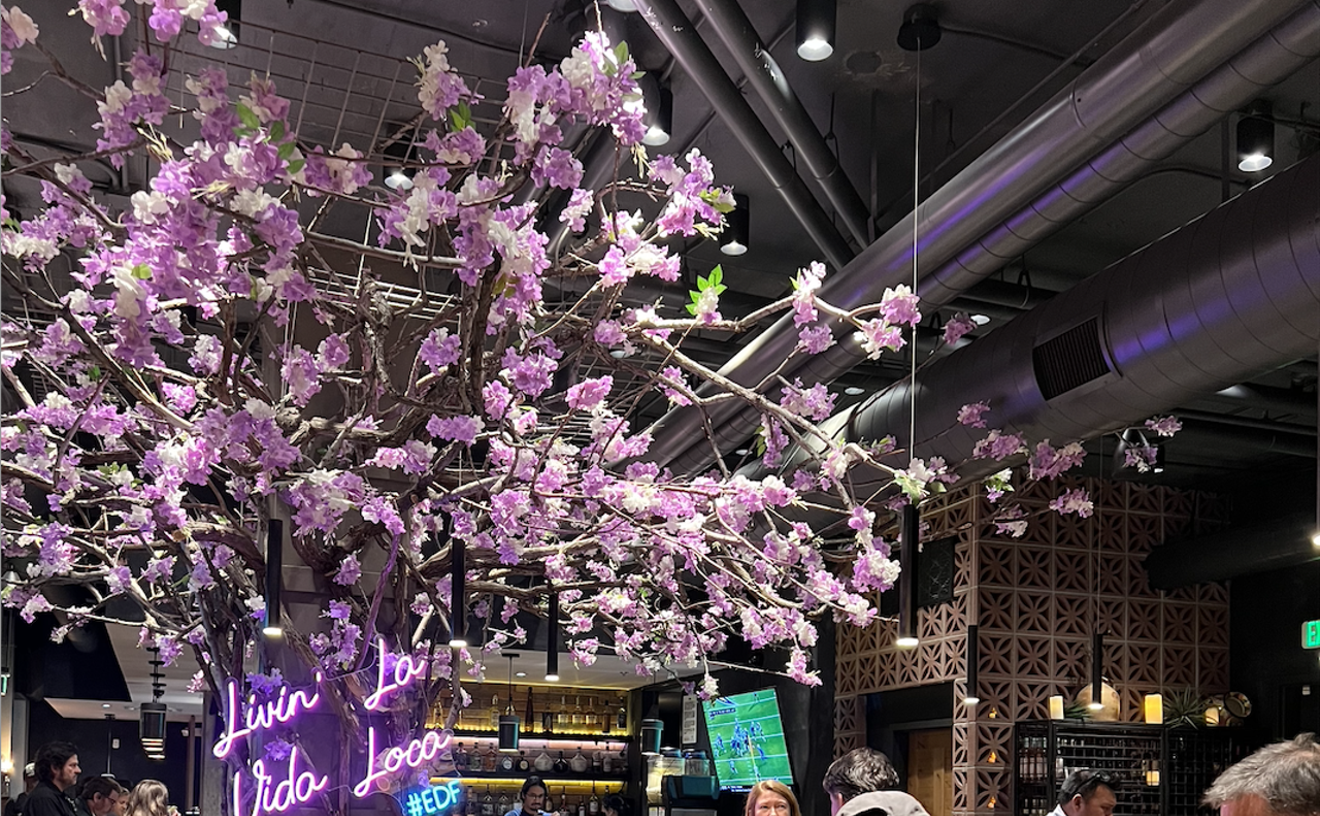As a kid growing up in Virginia Beach, Will Tuggle liked good food but didn't have much exposure to cooking. Since his mom and grandmother were Polish, homemade pierogi and cabbage soup were among his childhood comfort-food standards. He was generally shooed from the kitchen, though — if not by his mother, then by the aroma of the cabbage cooking. (He loved to eat it but hated the smell.) As for his father, "My dad was a god-awful cook," Tuggle remembers. "His only dish was spaghetti." But on a trip with his father to Aspen when he was ten, he ate an escargot dish that ignited a passion for fine cuisine.
See also: Pastry Chef Natalia Spampinato Puts the Sweet Into Bittersweet
Still, Tuggle never even picked up a pan until he was nineteen years old and needed some extra money during an extended vacation at Snowshoe Ski Resort in West Virginia. After having little luck convincing his dad to bankroll his time away from school (where he'd studied political science), a friend talked him into getting a job as a cook, telling him that the key was to memorize the phrase "86 on that."
Tuggle found that he enjoyed cooking and had a knack for it, so rather than just letting the front of the house know when he was out of — or 86ed on — something, he learned what he needed to get the job done. Craving more instruction, he went back home and got a job in a country-club kitchen, where he was taken under the wing of Alain Jacqmin, a Belgian chef with a Michelin-starred background whose wife was also pastry chef at the club. There he was introduced to the world of French cooking and to the brigade de cuisine system, which appealed to the sense of order and discipline he had acquired at the military academy he'd attended for high school.
Jacqmin tutored Tuggle on the side and also taught him the importance of self-reliance in the kitchen, once holding a suckling pig by the tail in one hand while using a knife with the other to break the carcass down. When Tuggle offered to help, the chef explained that good cooks need to know how to do things on their own. "Every door he opened for me, I jumped through," Tuggle says of his mentor.
Although he was a relative novice in the kitchen, Tuggle learned quickly by sticking to one rule: "If someone asked me if I knew how to do something — and I usually didn't — I would say, 'Yes, but show me your way.'" That approach helped him rise through the ranks. "I kept quiet and kept on working," he remembers.
It was not long before he decided that a return to school meant the Culinary Institute of America in Hyde Park, New York, rather than going back to political science. He entered the CIA on a scholarship, which he credits to his mentor, Jacqmin, who "wrote a glowing letter for me, and it pretty much paid for my first year and a half there."
School at Hyde Park meant he was close enough to New York City to make weekend excursions and explore restaurants. And when he graduated from the Institute, he moved to the city and worked in a multitude of eateries over the next several years. Among them were Daniel Boulud's Daniel and DBGB, where he learned about precision and detail from the famed chef and restaurateur. "I worked as a commis fifteen hours a day cutting intricate little vegetables," he recalls. "I'd have to cut up a case of eggplant, and Chef would inspect the pieces. If one was wrong, I'd have to do another case."
He also worked at Dovetail under John Fraser, whose approach — which Tuggle describes as "upholding the quality while diving into the food" — better fit his emerging style. Tuggle appreciated Fraser's ability to make cuisine more approachable, as well as his treatment of vegetables as proteins. "He pulled the French stick out of my ass," Tuggle says, and laughs. "He told me, 'You have to make sex on the plate.'"
He had other gigs in New York, too, helping friends open six different restaurants and working in more French kitchens — one so small he had to continuously duck his head to move from one end to the other. "I had headaches from hitting my head so many times," he notes. "But being limited by space drives your creativity and your menu."
It was in that space that Kevin Brown and Sean Huggard of Denver's Concept Restaurants found Tuggle while searching for a chef for their soon-to-open Stout Street Social, an expansive eatery in the heart of Denver's convention and theater district. Tuggle was already looking to move to Denver — his girlfriend had come here a year earlier for a new job — so he jumped at the opportunity to run a kitchen in the city he was already targeting. Tuggle stayed in New York for three more months, working with Concept Restaurants to hammer out menu details by phone and "endless e-mails," then moved to Denver at the beginning of November.
Stout Street opened with a chicken-liver dish that Brown and Huggard had tried while interviewing Tuggle in New York. "They told me they wanted the recipe even if I didn't take the job," he says.
Keep reading for more with Stout Street Social's Will Tuggle.
When coming up with the rest of the menu, they had to consider the eatery's location. Drawing from such a broad demographic — conventioneers and other visitors, theater-goers, suburbanites in the city for a special occasion, businesspeople spilling out of offices for happy hour and dinner — Stout Street Social needed to have dishes with a solid identity while appealing to a varied clientele. Tuggle describes much of the menu as "revamped classics with Denver appeal — cooking that's not so delicate, something you can jump into."Stout Street opened a month after Tuggle got to town, and he's been working almost every day since then, figuring out what will work and adjusting daily specials to the shifting customer base. "Once we started cooking, it veered toward my style," he says. "We're keeping up with the different demographics — a lot of out-of-towners. We're keeping an eye on the convention center."
Tuggle and his staff take note of the conventions coming to town each week and prepare specials based on the visiting groups. If there's an influx of Texas oilmen, for example, Tuggle will create beef dishes, whether steaks or flank tacos — but he always tries to put his own touch on the recipes. "It's always going to come from our heart," he explains.
Despite the variety of experiences he's had in such a short time, Tuggle remains grounded in the early training he received from his Belgian mentor. "Really, at the heart of my cooking — not only French — I feel like there's a reason to follow the people who have been doing it well for so long," he says. "I'm always going to stay with the classic mindset. Why am I going to roast butternut squash any other way than in a pan with a little oil and salt and pepper? People have food memory."
For Tuggle, the key to making customers happy is to appeal to that food memory while maintaining consistency and striving for perfection. He points to Acorn as a place that does this right. "Every dish is executed perfectly," he says. But he's also been to places that do it wrong: "If you can't execute it perfectly and the same every time, and if I can't make you happy, I'm not a very good chef or businessman. I've been on the receiving end of that $900 check where I would rather have gone to a taco place."
Although Tuggle has only lived in Denver for a few months, he visited his girlfriend regularly before moving here, and the two would spend weekends visiting restaurants recommended by friends. In addition to Acorn, the places that appeal to his style and level of perfection include Linger, Argyll, Humboldt and the Squeaky Bean. But as a fan of Asian cuisine, he often just grabs pad Thai from a joint near his restaurant.
Now that he's a Denver resident, he finds the relaxed pace appealing and plans to make this city his permanent home. Eventually he'd like to open his own restaurant — possibly more than one, so that he can have a place in California, which has the one thing Colorado lacks: a coast. "I grew up on the beach, so I miss the sound of the waves crashing," Tuggle explains.
But for now, the big new kitchen at Stout Street has him hooked. In New York City, the price of real estate meant that there was no room for error. "If you make one wrong move, you could be closing the doors the next day," he says. "People come into your restaurant and you think, 'I have to make this much money out of you, so I have to make you like my food.'" That's not the case in Denver: While at first Tuggle felt uncomfortable walking the dining room during dinner service, he soon realized that he could relax and enjoy speaking to customers. "It's fun — really fun," he says of the experience so far. "I get to appease my artistic side and be a businessman — what I've always wanted."
He's also been able to use a lesson he learned — from school and Alain Jacqmin — on how to foster talent in others. "Some people look at a prep cook and say, 'He's just a prep cook.' I don't believe in that." He's worked with his crews to bring out their strengths; he recently discovered that one of his cooks, who is from Africa, had been a baker there, and he is now encouraging him to use his baking skills here. And he's told his sushi chef — who has impeccable knife skills — to trust herself when creating new dishes. And in the meantime, maybe he'll put an old one, pierogi, on the menu. "I have a Polish kid working for me, so we've been talking about it," he admits.
And who knows, maybe some cabbage soup, too. If he can handle it, Denver diners can.
Follow @CafeWestword











